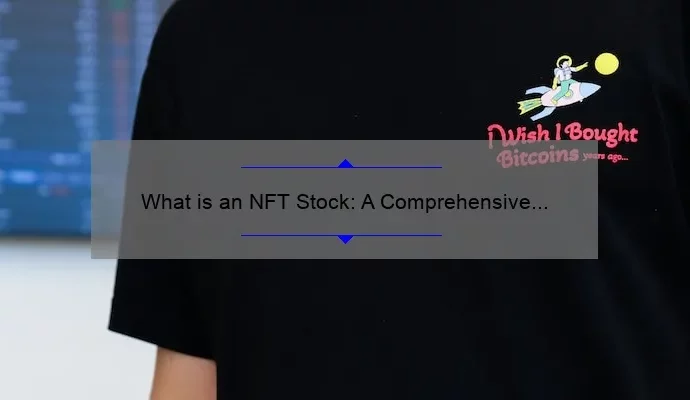Resposta curta what is an nft stock: Um NFT (Non-Fungible Token) é um tipo de ativo digital exclusivo que representa a propriedade ou autenticidade de um item específico, como arte digital, música ou vídeos. Ao contrário das ações em bolsa de valores, as quais representam participação em uma empresa, os NFTs não são ações e
Resposta curta what is an nft stock:
Um NFT (Non-Fungible Token) é um tipo de ativo digital exclusivo que representa a propriedade ou autenticidade de um item específico, como arte digital, música ou vídeos. Ao contrário das ações em bolsa de valores, as quais representam participação em uma empresa, os NFTs não são ações e não estão relacionados com o patrimônio social de uma empresa. Em vez disso, eles são tokens digitais únicos registrados em blockchain que podem ser comprados e vendidos pelos detentores para colecionar ou especular sobre seu valor. Os NFTs têm ganhado popularidade crescente no mercado criptoartístico e cultural nos dias atuais.
Understanding the Basics: What is an NFT Stock?
Understanding the Basics: What is an NFT Stock?
In recent years, NFTs (Non-Fungible Tokens) have taken the digital world by storm. These unique digital assets, which can represent ownership of various forms of digital content, such as artwork, music, videos, and even virtual real estate, have gained widespread attention and sparked a frenzy among collectors and investors alike. However, amidst the excitement surrounding NFTs, another term that has started to gain traction in investment circles is “NFT stock.” But what exactly does this term mean? Let’s delve into the basics to understand this concept.
Firstly, it’s important to clarify that an NFT itself is not a stock. An NFT represents ownership or proof of authenticity for a specific digital item but is not directly connected to any companies’ equity or shares. On the other hand, when we talk about an “NFT stock,” it refers to investing in companies associated with non-fungible tokens in some capacity. These companies are usually involved in different aspects of the NFT ecosystem like marketplaces, platforms for creation or trading of NFTs or providing infrastructure.
Investing in an NFT stock can offer exposure and potential profit from the growing popularity and adoption of NFTs. As more individuals and businesses recognize the value of owning unique digital assets through blockchain technology-backed tokens like these, it creates a substantial market opportunity for companies involved in supporting this emerging industry.
So why might someone consider investing in an NFT stock? One primary reason could be diversification. By including stocks related to non-fungible tokens within your investment portfolio alongside traditional stocks or other asset classes like cryptocurrencies or real estate properties, you broaden your exposure to different sectors with varying risks and returns.
Furthermore, investing in NFT stocks can also be seen as betting on the overall growth potential of this young industry rather than any specific underlying asset. Just as some investors bought shares in internet-related technology companies during the dot-com boom, anticipating the enormous potential of the digital age, investing in NFT stocks allows you to position yourself for potential future success should this disruptive technology continue to thrive.
However, as with any investment, it’s crucial to conduct thorough research and due diligence before leaping into this nascent market. Understand the fundamentals and business models of the companies you are considering adding to your portfolio and assess their financial health, competitive positioning, track record, and growth prospects within the NFT space.
It’s worth noting that while NFTs have gained immense popularity in recent months, they have also faced criticism and skepticism due to concerns surrounding environmental impact, high energy consumption related to blockchain transactions, copyright infringement issues, and speculative bubble-like behavior. These factors can influence both NFTs and associated company stocks. Therefore, informed decision-making is pivotal to navigate through these uncertainties.
In conclusion, an “NFT stock” refers to investing in companies involved in various aspects of the non-fungible token ecosystem. It provides a way for investors to gain exposure to this emerging industry alongside traditional investments for diversification purposes or betting on its long-term growth potential. However, due diligence and careful analysis are essential when considering investing in these stocks given the evolving nature of the NFT landscape.
Explained: Step-by-Step Guide to Understanding NFT Stocks
Welcome to our blog, where we will dive into the exciting world of NFT stocks and provide you with a detailed step-by-step guide to understanding this emerging investment opportunity. NFTs, or non-fungible tokens, have taken the digital world by storm, revolutionizing the way we buy, sell, and trade unique digital assets. In recent years, NFT stocks have become a hot topic among investors looking to tap into this booming market. So let’s break it down and help you navigate this fascinating investment avenue.
Step 1: What are NFTs?
To understand NFT stocks, it’s crucial to grasp the concept of NFTs. Unlike cryptocurrencies such as Bitcoin or Ethereum that can be traded equally for each other (fungible), NFTs represent ownership of a specific digital item like artwork, music, videos, or even virtual real estate. These tokens are built on blockchain technology that ensures authenticity and traceability.
Step 2: How do NFT Stocks work?
NFT stocks are shares in companies that operate in the NFT ecosystem. These companies might create platforms for buying/selling NFTs or invest in rare digital collectibles themselves. By investing in these stocks, you gain exposure to the potential growth of the broader NFT market without directly owning individual tokens.
Step 3: Researching NFT Companies
Due diligence is key when considering investing in any stock—NFT stocks included. To start your research process, identify prominent players within the industry: companies like OpenSea (the largest marketplace for NTFs), Dapper Labs (creator of NBA Top Shot), or Enjin (focused on gaming-related assets). Look for companies with solid fundamentals and a proven track record within the fast-evolving landscape of digital collectibles.
Step 4: Evaluating Market Potential
Like any investment opportunity, understanding market potential is essential when exploring NTF stocks. Consider factors such as market size, projected growth rates, and the level of competition within the NFT ecosystem. Additionally, studying industry trends and keeping an eye on mainstream adoption can provide valuable insights into future growth prospects.
Step 5: Risk Analysis
Investing in NFT stocks, like any emerging asset class, comes with inherent risks. Examples include regulatory uncertainties, market volatility, and technological challenges associated with blockchain scalability. It’s prudent to conduct a comprehensive risk analysis before committing your hard-earned funds. Diversification across different stocks and sectors can help mitigate some of these risks.
Step 6: Staying Updated
Stay ahead of the game by staying informed. Monitor news related to the NFT market as it rapidly evolves. Attend relevant conferences or webinars to gain insights from industry experts. Engage with online communities where enthusiasts share knowledge and research findings regarding NFT stocks. The more up-to-date you are with trends and developments, the better equipped you’ll be to make informed investment decisions.
Wrap Up:
NFTs have captured both media attention and investor interest worldwide, revolutionizing digital ownership in ways we couldn’t imagine just a few years ago. However, investing in individual NFTs may not always be feasible for everyone. That’s where NFT stocks come into play—offering a pathway to participate in this dynamic market through direct participation in companies shaping the future of NFTs.
Remember, understanding the nuances surrounding NTF stocks requires thorough research and consideration of all potential risks involved. Only invest what you are comfortable losing and consult with financial advisors if needed. With its unique blend of creativity, innovation, and investment potential—the world of NFT stocks is indeed an exciting space worth exploring!
NFT Stock FAQs: Answers to Common Questions
Title: NFT Stocks Demystified: Expertly Answering Your Burning Questions
Introduction:
Welcome to our comprehensive guide on NFT stock FAQs! In this article, we aim to provide insightful answers to the most common questions surrounding Non-Fungible Token (NFT) stocks. As the popularity of NFTs and digital art surges, understanding how they intersect with traditional equities is crucial for savvy investors. So let’s embark on a journey that demystifies NFT stocks with our professional, witty, and clever explanations.
1. What are NFT Stocks?
Picture a Venn diagram merging the world of finance and digital art. That intersection gives birth to NFT stocks. These unique securities represent ownership in companies or projects involved in creating, trading, or utilizing non-fungible tokens. Think of it as an opportunity to invest in the infrastructure that fuels the exciting world of digital collectibles while reaping potential financial gains.
2. How Do NFT Stocks Differ from Regular Stocks?
The key difference lies in their underlying assets. Traditional stocks grant you ownership in a company, entitling you to share its profits and losses. On the other hand, NFT stocks provide exposure to companies operating within the explosive market of non-fungible tokens and digital assets. By owning these shares, you can potentially profit from both business growth and increased adoption of NFTs.
3. Which Companies Issue NFT Stocks?
Though still emerging, several companies have embraced the concept of offering exposure to NFT-related businesses through publicly traded securities. Some notable players include online marketplaces specializing in NFTs such as OpenSea and Rarible or companies developing blockchain-based platforms for creators like Dapper Labs (creator of NBA Top Shot) or Enjin (focused on gaming). Keep an eye out for new entrants since this space is rapidly evolving!
4. What Risks Should I Consider When Investing in NFT Stocks?
As with any investment, there are risks to be aware of. One key consideration is market volatility, as NFTs have experienced rapid price fluctuations. Additionally, regulatory concerns and technical limitations may impact the future growth potential of NFT stocks. Keep a diversified portfolio and conduct thorough research to navigate these potential pitfalls effectively.
5. Are NFT Stocks Just a Fad or Here to Stay?
Ah, the million-dollar question! The rise of NFTs undoubtedly captures attention and raises skepticism simultaneously. While it’s challenging to predict the long-term fortune of any emerging trend, experts believe that the concept of digital ownership and scarcity isn’t going away easily. As more industries adopt blockchain technology and digital assets gain mainstream recognition, investing in companies involved in this ecosystem potentially positions you at the forefront of an exciting revolution.
Conclusion:
By reaching this point, we hope to have expanded your understanding of NFT stock FAQs beyond their surface level. Navigating the world of non-fungible tokens can be both intellectually stimulating and financially rewarding for those who take the time to grasp its nuances. Remember, knowledge is power – stay informed, embrace diversification, and approach your investment decisions with reasoned optimism. Happy trading!
Unraveling the Mystery: How Does an NFT Stock Work?
Title: Unraveling the Mystery: How Does an NFT Stock Work?
Introduction:
In recent years, Non-Fungible Tokens (NFTs) have taken the world by storm, revolutionizing the way we perceive digital ownership. Just when you thought things couldn’t get any more intriguing, a new concept has emerged – NFT stocks. But how exactly do these unique investments function, and what sets them apart from traditional stocks? Join us on a journey as we unravel this fascinating mystery.
The Rise of NFTs:
Before diving into NFT stocks, it’s crucial to grasp the concept of Non-Fungible Tokens. Just like cryptocurrencies such as Bitcoin or Ethereum, NFTs are built on blockchain technology; however, they represent something entirely different – one-of-a-kind digital assets. These assets can range from digital art and music to virtual real estate and even individual moments captured in time.
What are Traditional Stocks?
To comprehend how NFT stocks work, let us first establish a baseline understanding of traditional stocks. When you purchase stocks in a company, you acquire a fractional ownership stake in that particular enterprise. Your investment fluctuates based on market demand and various financial factors relevant to the company’s performance.
Introducing NFT Stocks:
Now comes the exciting twist – blending the innovative nature of NFTs with traditional stock investments gives birth to NFT stocks. An NFT stock represents ownership not just over a specific asset like a piece of art but rather over a portion of shares in an underlying business entity.
How do They Function?
NFT stocks adopt several intriguing features derived from both traditional stocks and their non-fungible counterparts. When you acquire an NFT stock, it essentially serves as proof of your ownership within that specific stock’s ecosystem while retaining its unique characteristics through blockchain technology.
The Unique Appeal:
Whereas conventional stocks predominantly rely on numerical values representing shares, conversely, owning an NFT stock adds a tangible layer of exclusivity. The NFT aspect allows investors to indulge in the creative, collectible, and even social elements associated with non-fungible tokens.
Trading and Liquidity:
One might question how liquidity is maintained when dealing with NFT stocks, considering their unique nature. Fortunately, platforms that facilitate NFT stock trading allow for seamless buying and selling transactions through decentralized exchanges. These exchanges ensure transparent and secure trading environments while providing opportunities for investors to diversify or exit their positions as needed.
The Future Outlook:
With the rise of blockchain technology and the growing popularity of NFTs, it’s no surprise that NFT stocks have captured the attention of both enthusiasts and traditional investors alike. As this hybrid investment model continues to evolve, we can anticipate increased involvement from businesses across various industries eager to explore this new frontier.
Conclusion:
In conclusion, NFT stocks represent an intriguing merging of traditional finance with the captivating world of digital collectibles. By combining aspects of conventional stock ownership with unique features inherited from Non-Fungible Tokens, they offer investors a novel way to engage not only in financial markets but also in art, culture, and creativity. As this exciting sector evolves further, one thing is certain: understanding how NFT stocks work provides us with a glimpse into the future intersection between technology and value representation in our increasingly digital world.
Diving Deeper into NFT Stocks: What You Need to Know
In recent months, the world has been buzzing about Non-Fungible Tokens (NFTs) and their potential to revolutionize various industries, from art to gaming. NFTs have gained substantial attention for their ability to authenticate and prove ownership of digital assets using blockchain technology. But did you know that there are actually stocks linked to this rising trend?
NFT stocks provide an opportunity for investors to tap into the growing market of digital collectibles without directly participating in the buying and selling of NFTs themselves. These stocks represent companies that either specialize in NFT creation, marketplace infrastructure, or have ventured into the space by converting their assets into NFTs.
Let’s dive deeper into what you need to know about NFT stocks.
1. Understanding Non-Fungible Tokens (NFTs)
Before delving into NFT stocks, it’s crucial to grasp the concept of non-fungible tokens. Unlike cryptocurrencies such as Bitcoin or Ethereum that are interchangeable with one another, each NFT holds a unique value or characteristic. Imagine owning a trading card with a holographic design – that’s similar to owning an NFT.
2. The Potential Growth of the NFT Market
The market for NFTs is expanding rapidly, with record-breaking sales grabbing headlines worldwide. From sports highlights and digital artwork to virtual real estate and collectible virtual pets, people are increasingly willing to invest significant amounts in these one-of-a-kind digital assets. As demand surges, companies operating in this space may witness exponential growth.
3. Companies Specializing in NFT Creation
Some organizations focus on creating unique and authentic digital collectibles; think of them as the artists behind these virtual masterpieces. Investing in companies like these allows you to indirectly profit from increasing demand for newly minted NFTs.
4. Marketplace Infrastructure Providers
Another category includes companies providing platforms or infrastructure for buying and selling NFTs securely and efficiently. These companies act as intermediaries between creators and buyers, ensuring smooth transactions and compliant operations. Investing in such organizations allows you to gain exposure to the growing NFT market, benefiting from increased trading volumes.
5. Traditional Companies Entering the NFT Space
Beyond specialized NFT businesses, traditional companies are also joining the party by converting their existing assets into digital collectibles. Major brands, artists, celebrities, and even sports leagues have started tokenizing exclusive items or experiences to directly engage with fans in the digital realm. This expansion opens up new investment opportunities tied to familiar names and established entities entering the NFT industry.
6. Evaluating Risks and Opportunities
As with any investment, it’s important to carefully assess risks alongside potential rewards. The volatility of both cryptocurrency markets and emerging technologies adds an extra layer of uncertainty when investing in NFT-related stocks. Additionally, regulatory developments surrounding NFTs could significantly impact the landscape. Unless you thoroughly understand these risks and do your due diligence on individual companies’ fundamentals, caution should be exercised before jumping headfirst into this sector.
In conclusion, while NFTs continue their meteoric rise in popularity, multiple investment opportunities exist beyond purchasing individual digital assets directly through stocks tied to this burgeoning market. Understanding the different categories of NFT stocks – those involved in creation, marketplace infrastructure, or those venturing into tokenizing existing assets – can help investors navigate this exciting space successfully.
However intriguing these investments may seem given the potential upside of the budding NFT trend, always remember that thorough research and diversification remain essential to any well-formed investment strategy. So whether you’re a seasoned investor or a curious newcomer exploring new avenues for growth – enjoy diving deeper into this brave new world of NFT stocks!
What Are the Benefits of Investing in NFT Stocks?
Investing in NFT (Non-Fungible Token) stocks has become a hot topic in the financial world, as this budding market continues to gain traction and popularity. NFTs represent unique assets that are digitally tokenized, allowing individuals to buy, sell, and own them using blockchain technology. While the concept of investing in NFT stocks might seem perplexing at first, it offers a range of benefits that are worth exploring.
Firstly, one of the key advantages of investing in NFT stocks is the potential for massive returns on investment. As seen by recent high-profile sales and auctions, some NFTs have fetched millions of dollars. This rapid price appreciation can create lucrative investment opportunities for those who dive into this market early on. Just like with any investment, there are risks involved, but if investors can identify promising NFT projects or tokens with strong potential, they could reap substantial financial rewards.
Furthermore, investing in NFT stocks provides exposure to a fast-growing and innovative sector within the digital economy. The blockchain technology that underpins NFTs is revolutionizing various industries such as art, gaming, collectibles, and even real estate. By investing in companies leveraging this technology or directly involved in the creation and trading of NFTs, investors position themselves at the forefront of disruptive trends that have the potential to reshape entire industries.
Another advantage of investing in NFT stocks is the diversification it offers within an investment portfolio. Traditional investments like stocks or bonds might not provide exposure to digital assets or blockchain-related ventures. Including NFT stocks can bring diversity to one’s holdings while reducing overall risk through broader asset allocation strategies.
Moreover, investing in NFT stocks allows individuals to align their portfolios with their personal interests and passions. Unlike traditional financial instruments where investments may feel detached from individual preferences, many people find that buying shares in companies associated with areas they genuinely care about—such as art or gaming—adds an additional level of fulfillment to their investing journey. It allows investors to support their favorite artists, creators, or projects while potentially benefiting from their success.
In addition to financial gains and diversification, investing in NFT stocks can also provide intellectual stimulation. The nascent nature of the NFT market requires investors to stay informed about the latest trends, emerging projects, and developments within the digital art world. Engaging with online communities focused on NFTs can foster a sense of camaraderie among like-minded enthusiasts and offer opportunities for exchanging ideas, insights, and trading strategies.
Lastly but certainly not least important is the potential for social impact. Investing in NFT stocks can contribute positively to various causes. Many NFT platforms allocate a percentage of transaction fees or proceeds from sales to initiatives such as charitable donations or environmental conservation efforts. By supporting projects that prioritize sustainability or employ fair compensation models for artists and creators, investors can actively participate in promoting ethical practices within the NFT ecosystem.
To sum it up, investing in NFT stocks comes with its fair share of benefits—it provides the potential for high returns on investment, exposure to an innovative sector within the digital economy, diversification opportunities for portfolios, alignment with personal interests and passions, intellectual stimulation through staying informed about trends and developments worldwide, and the chance to contribute to positive social impacts. With careful research and risk management techniques in place, investors can navigate this exciting market space while capitalizing on its promising potential.
 FraternIdadecrypto
FraternIdadecrypto 



















